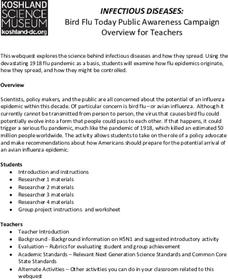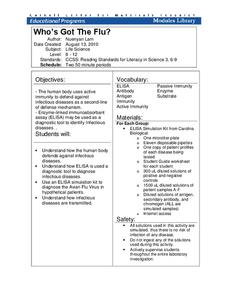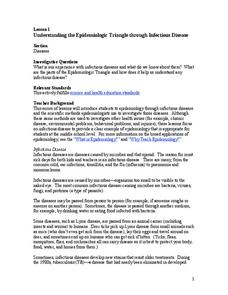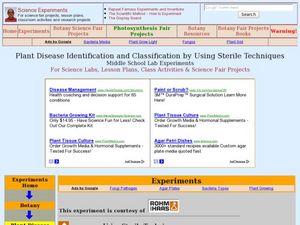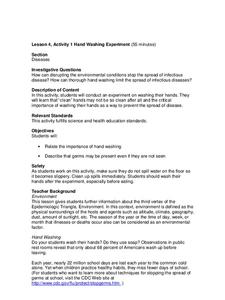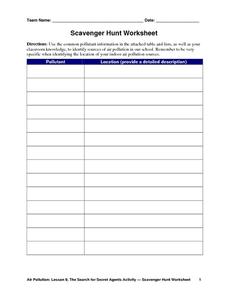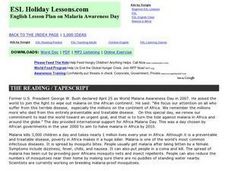Children’s Hospital of Philadelphia
Understanding How Diseases Spread
To boost disease prevention, high schoolers arm themselves with information about infectious diseases and how they spread. Scholars research the causes, prevention techniques, and identify high-risk groups especially vulnerable to a...
Centers for Disease Control and Prevention
Understanding the Epidemiologic Triangle through Infectious Disease
Introduce infectious diseases and the epidemiologic triangle. A helpful resource describes the agent, host, and environment from the three vertices as well as the time factor, which is in the middle. Scholars complete a simple...
National Academy of Sciences
Infectious Diseases: Bird Flu Today
Understanding how viruses spread has never been more important. A well-designed WebQuest lesson has young scientists research viruses, how they spread, and how they are treated. They also consider the trends in common viruses in the world.
Curated OER
Infectious Disease Detectives
Students participate in a simulation of how diseases are transmitted. Each student holds a test tube, with only one containing the "disease" while the others have water. They move around the room until told to stop. Using droppers to...
Curated OER
Infectious Diseases and Africa
Tenth graders examine the impact of diseases on Africa. In this World History activity, 10th graders prepare a presentation on a specific disease. Students create a plan of action to help that disease.
Cornell University
Who’s Got The Flu?
Become an immunologist for the day. Scholars elicit the use of the enzyme-linked immunoabsorbent assay (ELISA) to diagnose an infectious disease. Through the process, they learn about the immune system response to infectious diseases.
Curated OER
Understanding the Epidemiologic Triangle through Infectious Disease
Students examine the epidemiologic triangle. In this disease lesson, students discuss infectious disease as they study how they spread and discover their families' experiences with them. Students research Internet sites to complete...
Curated OER
Plant Disease Identification and Classification by Using Sterile Techniques
Seventh graders identify how to use sterile techniques when identifying plant pathogens. For this plant diseases lesson students complete a lab activity in which they see how plant diseases are identified and classified.
Curated OER
Using Sterile Techniques as a Tool in Studying Plant Diseases
Seventh graders examine the concept of sterile techniques. They realize that plant diseases can be identified and classified in various way. Students identify some of the diseases that attack the garden plants.
Curated OER
Biosecurity Keeps Everyone Safe
Students evaluate websites and determine whether they are valid or invalid resources regarding the topic of infectious diseases and animals. They explore a variety of websites, write a research paper about biosafety, and complete a...
Centers for Disease Control and Prevention
Hand Washing Experiment
An engaging experiment allows scholars to understand why the recommendation is to wash for 20 seconds with soap and water — while making them aware of their own habits!
Curated OER
Hazard Mitigation: Bioterrorism
Students discuss different ways to spread infectious diseases. In this bioterrorism lesson, students model the rate of smoke emission using CalRoad software. They analyze the effects of airborne release of biological...
Curated OER
Anthrax Scare
Students visit the website for the Center of Disease Control. They examine the anthrax page and read through the frequently asked questions. They discuss what needs to be known about the anthrax vaccine and how it is used as a weapon.
Curated OER
Living Longer
Students view a short video about diseases that are most common today and what ones were common fifty years ago. They examine demographic trends in developing and industrialized countries. They research life expectancy, birth rate and...
Curated OER
Human Papillomavirus: Investigating the Prevention, Transmission, and Treatments of a Viral Infection
Tenth graders explore the different health risks associated with human papillomavirus. In this health science lesson, 10th graders identify different ways to prevent viral and bacterial infection. They research and develop an awareness...
Curated OER
Scavenger Hunt Worksheet
Exactly how environmentally friendly is your school? From the air fresheners in the bathrooms to the cleaning solvents used in the classrooms, young conservationists search the school grounds for sources of air pollution in...
Curated OER
ESL Holiday Lessons: Malaria Awareness Day
In this ESL reading comprehension worksheet, students read a passage about World Malaria Awareness Day. Students answer 100 varied questions about the text. There are links provided for online exercises and MP3 listening as well.
National Center for Case Study Teaching in Science
A Case Study Involving Influenza and the Influenza Vaccine
Using a hypothetical discussion between two coworkers broken up into four parts, budding biologists examine the flu shot and some of the typical arguments for and against it. The conversational nature of the reading makes it engaging and...
Curated OER
Gasping for Truth
Twelfth graders investigate global responses to fighting the spread of severe acute respiratory syndrome, then write a news report for people in their region of study.(April 3, 2003)




